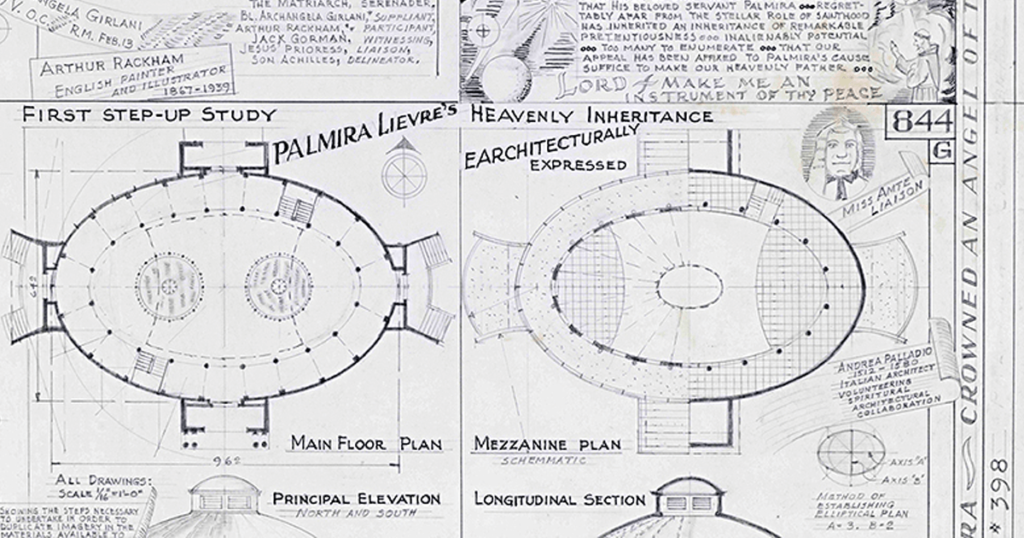
The catalog of the exhibit “Vestiges and Verse: Notes from the Newfangled Epic,” at the American Folk Art Museum in New York, fails to note that the complex and ambitious architectural drawings of Achilles G. Rizzoli (1896–1981) incorporate numerous sonnets. True, we’re told that in “the late 1920’s until 1934, [Rizzoli’s] attention was primarily centered on writing literature and poetry.” (Literature and poetry? Two separate species?) Then, when Rizzoli’s literary efforts found no publishers, he focused on drawing and worked as an architectural draftsman. But a close look at Rizzoli’s large and meticulous black-and-white drawings—they look more like blueprints—reveals sonnets lettered in almost every one: poetic form unobtrusively deployed, rhyme and meter flawless, the boxy sonnet shape punctuating the pages like a window letting light into a wall, into the box of a room, organizing space. Not that Rizzoli’s art accommodates many empty spaces. All its surfaces are embellished in crisp black and white: images, prayers, aphorisms, words collaborating with images. Not an inch of paper is wasted. Still, there’s a sense throughout Rizzoli’s work of a spaciousness notably absent from some of the work of the other self-taught artists in this remarkable show, with its collages and constructs and schemata, eloquent, idiosyncratic, and private.
An unremittingly cold spring is beginning, in this second week of April in New York, to relent and soften into sunshine. Snowdrops, daffodils, forsythia, a promise of magnolia blossoms. In Richard Tucker Park by Lincoln Center, balloons festoon a statue. In Straus Park in Morningside Heights, the annual commemoration of the sinking of the Titanic is about to be observed. The lavishness and tenderness and cruelty and absurdity of the world are especially on display every spring, a contrast captured precisely by Robert Lowell’s phrase “Our magnolia ignite … their murderous five days’ white.” The sky opens to warmth and light even as it closes for someone, even as it constantly closes and opens. “Right behind / my limousine is someone else’s hearse / unnoticed,” writes Deborah Warren in her poem “About Suffering.” A year ahead of me at Radcliffe, Deborah was one of the English majors in Whitman Hall who used to wear rubber gloves when they were reading novels in Signet Classics editions, since the ink tended to come off on their hands. I was a classics major who bit my fingernails; no rubber gloves for me. For the past 20 years, Deborah has taken the gloves off, or repurposed them; she has been writing—sculpting?—exquisitely chiseled poems.
Not every hearse, of course, is unnoticed. Today’s hearse has attracted plenty of notice in many circles: the death of J. D. McClatchy, word of which reached me earlier this morning. This particular someone was a poet, editor, librettist, critic, teacher, a man of great generosity and seemingly inexhaustible energy, a man many people knew. Indefatigable; mortal. Sandy McClatchy’s illness didn’t prevent him from working on poems and a libretto right up until the end.
Every spring, the world shrinks and expands, seeming smaller because someone we know left it, larger because the good news, the very generously good news, of this particular life flings brightly colored streamers back over the years, over the trail of memories, the encounters and conversations. Death always gives something back to the living.
Is it possible to braid them together: the spring, slow to arrive but now advancing fast; the terrifying state of our country and the world; our granddaughter, 15 months old, toddling with her bottle in one fist, her new teeth, her smiles of discovery and trust; this death? To honor the poetry, the blossoms, and the blight? The unlikely lavishness and extravagance of the season, of the art in the American Folk Art Museum, its manic mimicry, artists busy at their work of organizing loneliness in space, of representing some version of the world—it all feels like cause for celebration.
The gift of art keeps giving. Later in the day that began with news of Sandy’s death and moved on to the sunny stroll to Lincoln Square, the flowering parks, and the art exhibit, a book arrives: Stephen Yenser’s annotated edition of James Merrill’s The Book of Ephraim. The endpapers reproduce a few of Merrill’s notes and doodles, which at first glance look like smaller, sketchier versions of some of the art on display in “Vestiges and Verse.” But they turn out to be reproductions of Merrill’s jottings toward, rough blueprints for, the astonishing poetic edifice that Ephraim became. In the book I find a card: “Compliments of the Author.” I’m reminded that in March of 1995, a month after Merrill’s death, his last book of poems, A Scattering of Salts, arrived one afternoon in the mail. The book contained a card: “Compliments of the Author.” Who says that poets die?
Rizzoli’s “symbolization” drawings, the catalog tells us, “represent metamorphoses of friends, neighbors, and family members … personalized depictions function as memorials and vestiges.” “Well,” as Merrill almost wrote at the end of his poem “An Urban Convalescence,” “that is what art does.” (What he actually wrote is “that is what life does.”)
A poet dead, streams of memories, an exhibit that exhumes and elegantly displays obscure private art, the spring advancing, an unexpected and welcome book arriving out of the blue. Blossoms and balloons. Hearses and strollers. Embedded sonnets everywhere you look.

